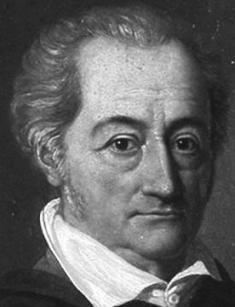
Johann Goethe: biography
Johann Wolfgang von Goethe is a German writer, playwright, and poet, who left a mark in the history of world literature. The eternal works of this author bare a philosophical meaning. The creator of the famous Faust was a kind and mysterious man who had a vast scientific knowledge and was an expert in law.
The genius of German literature was born on 28 August 1749 in Germany, in the flourishing trade center, the Free Imperial City of Frankfurt. The talented boy spent his childhood in a quiet and cozy house that would later become the museum of Johann Wolfgang von Goethe.
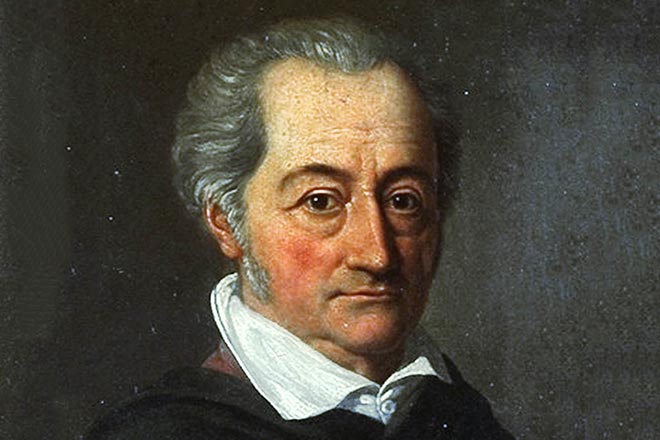
The writer's parents were noble people: Johann Caspar Goethe was a lawyer and Imperial Councillor, and Catharina Elizabeth Textor was the daughter of the city's Supreme Judge, Johann Wolfgang Textor. It is worth mentioning that Caspar's wife is 21 years younger than him. The girl got married to the lawyer at a young age and at first, did not have romantic feelings towards him at all.
Caspar Goethe was well-off and could afford everything, thanks to a large inheritance from Friedrich Georg, his father. Goethe's grandfather earned the great fortune himself, making the way from tailoring to owning a pub. Even though Johann's father was a clever man with a strong will, he had limited knowledge and was very strict.
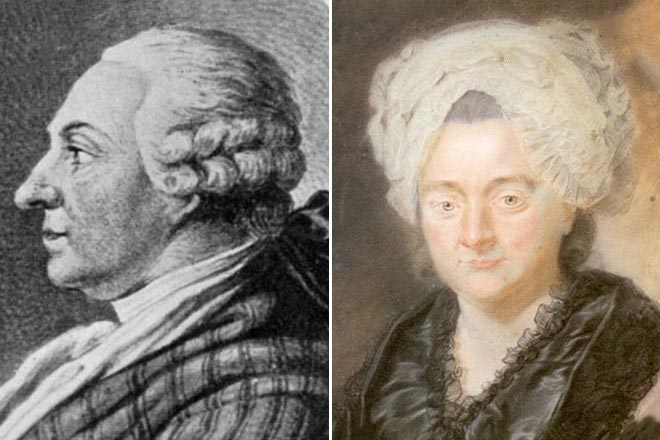
The head of the family did not work as the inherited money was enough for the whole life. Instead of hard work, Caspar traveled a lot; he was particularly fond of Italy and Rome's culture. He also collected books for his private library, which the future author of Faust read zealously. Friedrich's shelves comprised about two thousand books, a proper literary fortune.
At the age of six, little Goethe started taking an interest in religion. After an earthquake in Lisbon, the boy started questioning the existence of God. If he existed, then why did he take the innocent good people who died in the natural disaster? Johann had sister Cornelia, whim whom they had a close connection. Besides the boy and the girl, Catharina gave birth to four more children, but they all died in infancy.
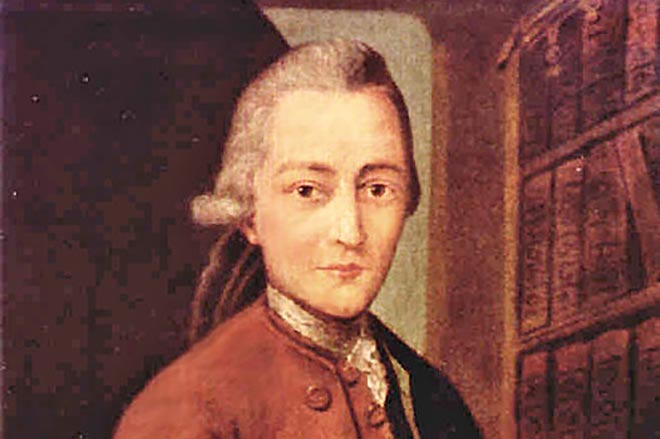
The writer's mother is the opposite of her spouse: Catharina was a cheerful and friendly woman, who tried to look at all the aspects of life from an optimistic point of view. Because of her bright nature, little Goethe loved Catharina more than his father, but despite frequent fights and quick-temper of Goethe Senior, he also became friends with his dad.
Catharina did not receive higher education, a common thing for a woman of that time, but the housewife loved to read and was fond of theater. Little Johann loved the fairy tales that his mother read to him before bed: Catharina made them up herself. However, the woman had a cunning: the future writer confessed his worries to his grandmother, and she would pass on the "secret" to his mother. Thus, Catharina knew what to speak of in her next fairy tale.
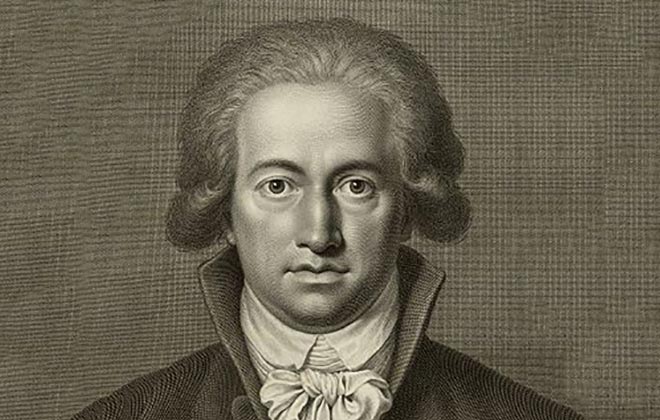
The future German literary figure Johann Goethe grew up in a cozy atmosphere, full of love and understanding. Even though the boy's parents were well-off, Goethe was not a spoilt child. From an early age, he was fond of literature, read The Metamorphosis and Iliad. When the boy was four, he received a great gift from his grandmother, a small doll-house. Little Goethe liked to play with toy theater and came up with short sketches. Johann started writing poems at the age of 10. Since then, the great future author called himself a poet.
From 1756 to 1758, young Goethe attended middle school, and then switched to home-schooling. Friedrich was generous when it came to his children's education, so only private tutors taught Johann and Cornelia. The boy studied foreign languages, natural science, and art. Besides, homeschooling included horse riding, fencing, dancing, as well as the piano and the cello lessons.
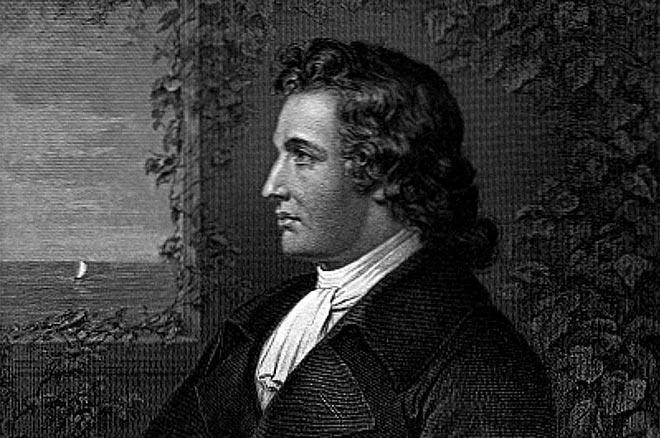
His lessons in French, Greek, English, and Latin helped young Goethe to write the poetic novel about brothers and sisters who write each other letters in different languages. The boy wrote the first novel because of boredom; he was tired of doing his homework.
In the fall of 1765, Goethe entered Leipzig University, which is considered to be one of the most prestigious institutions in Germany. Caspar wanted his son to follow in his footsteps, so he signed Goethe up for law faculty. However, Johann reluctantly attended classes concerning the law, preferring natural science and literature. Goethe liked listening to the lectures of German poet and philosopher Christian Gellert. During his university years, he also met Johann Winckelmann, whom he considered his mentor.
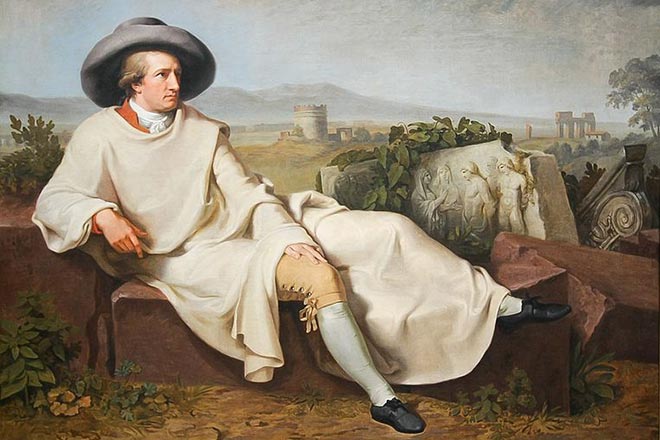
Being in "Little Paris" Goethe lived in Neumarkt, in a house called Fireball. Young Goethe was a friendly student, and he had a lot of friends from his class with whom he met and went to the theater, musical concerts, and played cards. Goethe was very fashionable when it came to clothing. However, at first, the student went to the city in a basic outfit of a countryman.
Caring Caspar, who did not spare money for his son's fun and clothes, sent the student 100 gulden a month, which at the time was a reasonable sum.
Despite his wit and diligence, Goethe could not graduate from the university. Because of tuberculosis exacerbation in the summer of 1768, the young man had to return to his hometown. Because Johann came back to Frankfurt without a diploma, he started fighting with his father.
Literature
After coming back to Leipzig, Goethe was ill and stayed at home for a long time. During his sickness, Goethe wrote his first work, the comedy Die Mitschuldigen.
In 1770, Goethe, hoping to receive law education, went to Strasbourg. At the new place, the future writer started taking an interest in chemistry, medicine, as well as philology. There he met German writer Johann Herder, who was a positive influence for the young man.
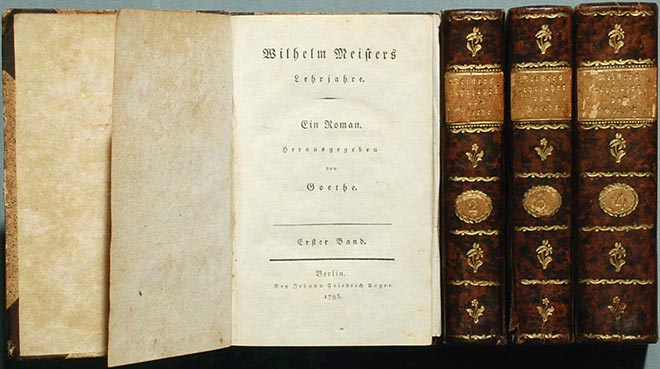
In the new city, young Goethe formed himself as a poet and became part of the Sturm und Drang movement. It was almost the same as sentimentalism in Europe: in the place of famous rational-thinking figures come admirers of feelings and emotions.
In Strasbourg, Goethe fell in love with Friederike Brion, and the young poet dedicated love verse to her: "Willkommen und Abschied," "Sesenheimer Lieder." After some time, Goethe wrote Brion that his feeling grew fainter.
In 1773, Goethe wrote a play about a Swabian knight, Götz von Berlichingen, which brought the young writer popularity among contemporaries.
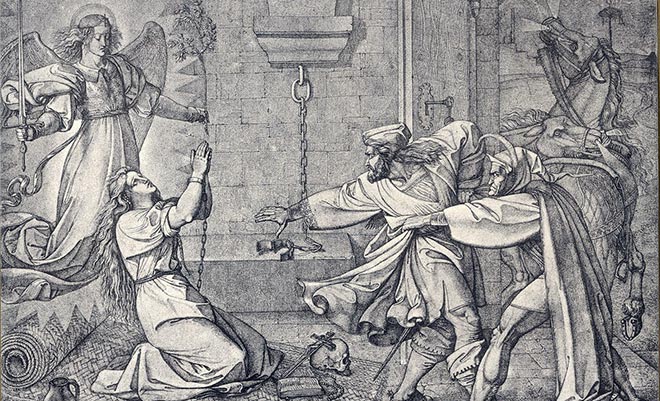
In 1772, Goethe went to Wetzlar to practice law at his father's insistence. In the old town, the young man fell passionately in love with Charlotte Buff, having met her on a dance evening. The beauty of the young girl captures the eye of the poet. Having spent an evening with Goethe, Charlotte did not reciprocate to young Johann's feelings, and the writer fell into depression.
But this brief meeting was of great significance, because of it, in 1774, Goethe created his incredible work, The Sorrows of Young Werther, Charlotte inspired Goethe for the character of Lotte. The novel in letters told the story of a young man who desperately fell in love and took his own life. Such an outcome came to Goethe because of his friend Karl Wilhelm Jerusalem, who shot himself in 1772 because of his feelings towards a married woman.
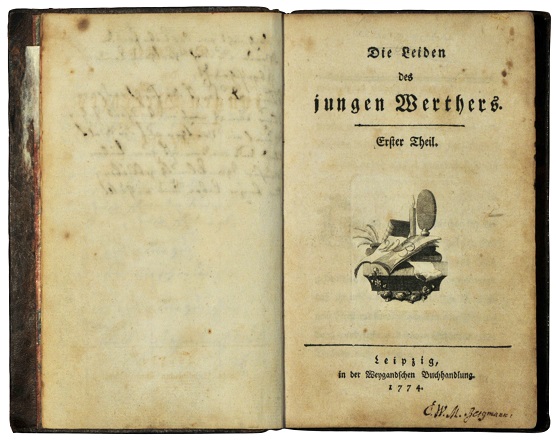
The book about unrequited love of Werther became popular and brought Goethe fame, although, in Germany, there was a wave of suicides connected with respect. Young Germans took Goethe's work too seriously. Therefore, in some cities, Johann's book was even banned.
Faust
On the shelves of the Goethe family, there was a book about Johann Georg Faust. This man, who lived in the 15th-16th century, was a mysterious figure, who interested many poets of the generations to come. And of course, Goethe also felt the interest for the mysterious black magician, who liked to study occult science and alchemy.
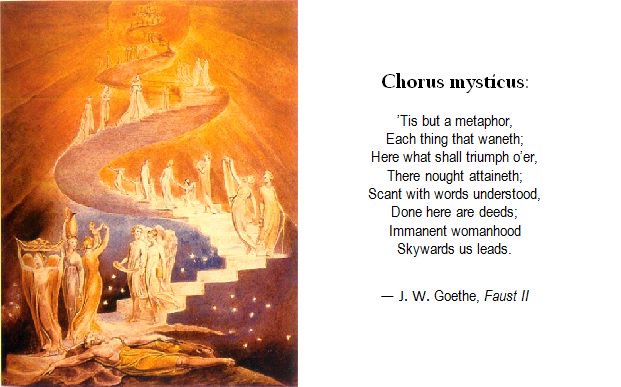
Johann Wolfgang von Goethe worked on the Faust poem for the more significant part of his life, starting at the age of 20. This work is ingenious in its structure and plot, and it reflects the literary views of the poet, which changed through the years of writing.
For the first time, an extract from Faust was published in 1808, and the whole book consisting of several parts, came out in 1832.
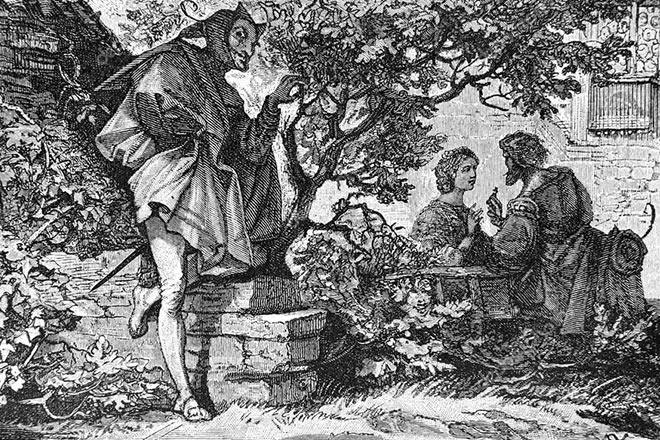
Goethe's tragedy was translated into many foreign languages and is still considered a national heritage. Percy Bysshe Shelley did the English translation. In 1870, another English translation by Bayard Taylor came out.
The quote of the evil spirit is an epigraph for Mikhail Bulgakov's The Master and Margarita:
"I am a part of this force that always wants evil and always does good," - said Mephistopheles, whom the Russian writer depicted in the character of Voland in his book.
Another famous mystical work of Johann Wolfgang von Goethe was his poem "Erlkönig," written in 1782. The plot tells the story of a supernatural being who killed a baby: Goethe drew an analogy with the boy's illness. Is the main character of "Erlkönig" mad, or did he met the evil King himself?
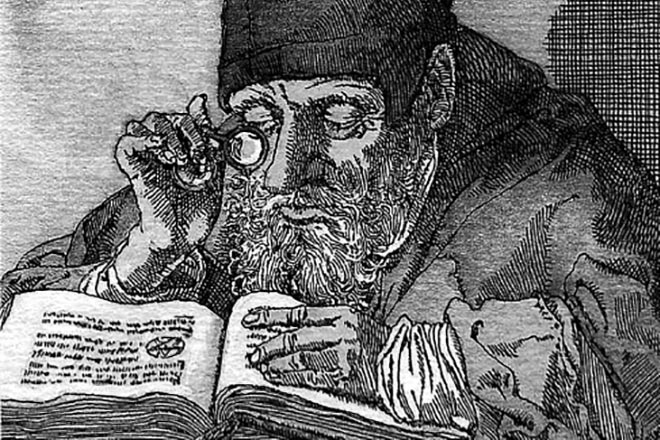
This poem became Goethe's widely-known work; it could easily be ascribed to epic literature. The poem was also featured in literature and music: Nabokov wrote the novel Pale Fire, and the German band Rammstein composed the song "Dalai Lama."
Personal life
Goethe was a charming and kind person who managed to acquire all the necessary knowledge. Because of his interest in art and literature, Goethe developed his character from early childhood, reading the eternal classic novel.
Despite his sociability, Johann Wolfgang von Goethe was known as a mysterious man; some historians think that a part from Heinrich Faust's nature was taken from the poet himself.
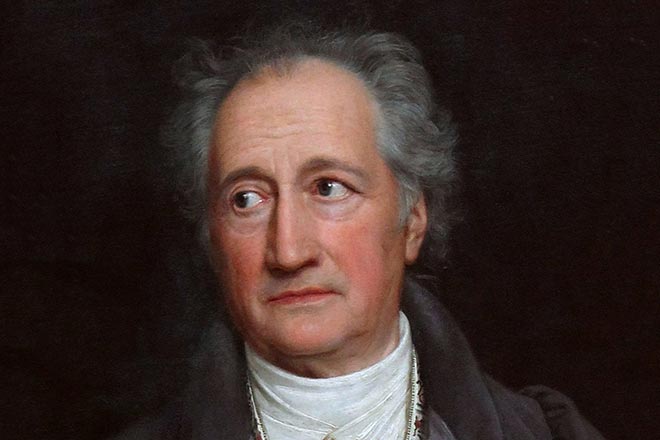
Even in photographic portraits of Johann Goethe, there is a mystery; his brown eyes seemed to behold some secret, unknown to everyone else.
Goethe was popular among women, to write a book about the love affairs of the German classic would not be enough to tell the whole story. And only Christiane Vulpius made the poet love her for thirty years.
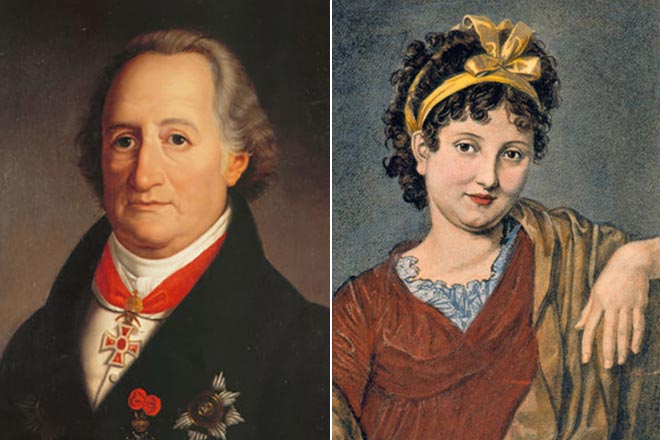
Christiane Vulpius was not a beauty, like Charlotte, the writer's first love, but she captured Goethe with her simplicity and sincerity. They met randomly on the street, and the girl passed the future husband a letter. The poor peasant enchanted Johann Wolfgang von Goethe so much that he immediately suggested that the girl should move in his estate. The majority of the poet's mistresses considered the writer's choice an offense because he preferred a peasant. Goethe and Christiane had five children, even though the German classic had off-springs from other women too.
In his spare time, Goethe grew violets and collected stamps.
Death
In the spring of 1832, Goethe fell ill during a ride in an open carriage, and the sickness deteriorated the health of the 82-year-old man. On March 22, the poet died of cardiac failure. The last words of the author of Faust were as follows:
"Please, close the window."
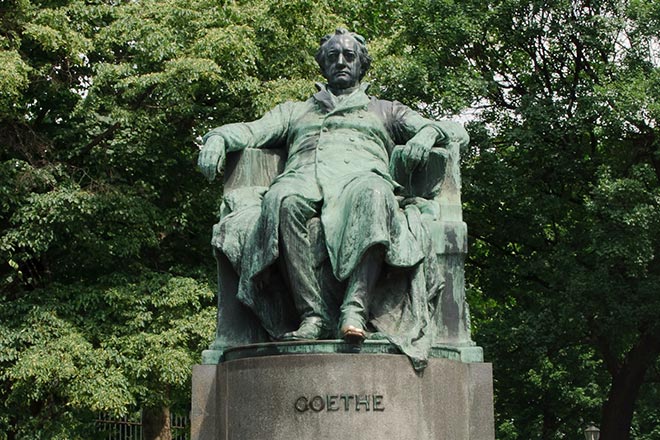
In different countries, monuments were erected in honor of Johann Wolfgang von Goethe. A Mercury crater, goethite mineral, and the purple rose were named after Goethe.
Quotes
"There would be far less suffering amongst mankind, if men -- and God knows why they are so fashioned -- did not employ their imaginations so assiduously in recalling the memory of past sorrow, instead of bearing their present lot with equanimity."
"Faith is private capital, kept in one's own house. There are public savings-banks and loan-offices, which supply individuals in their day of need, but here, the creditor quietly takes his interest for himself."
"Those who hope for no other life are dead even for this."
"Everyone believes in his youth that the world began with him and that all merely exist for his sake."
"It never occurs to fools that merit and good fortune are closely united."
Bibliography
- The Sorrows of Young Werther (1774);
- Iphigenie auf Tauris (Iphigenia in Tauris) (1787);
- Metamorphosis of Plants (1790);
- Torquato Tasso (1790);
- Römische Elegien (Roman Elegies), collection (1790);
- Wilhelm Meisters Lehrjahre (Wilhelm Meister's Apprenticeship)(1796);
- Faust (1808-1831);
- Die Wahlverwandtschaften (Elective Affinities) (1809);
- Wilhelm Meisters Wanderjahre, oder Die Entsagenden (Wilhelm Meister's Journeyman Years, or the Renunciants/Wilhelm Meister's Travels) (1821);
- Novella (1828);
- Westöstlicher Diwan (The West-Eastern Divan) (1819);
- "Marienbad Elegy" (1823).




